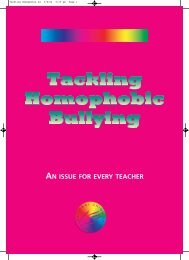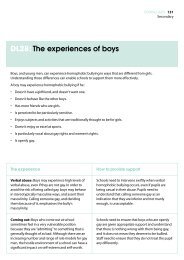Non-Normative Gender and Sexual Identities in Schools: - Schools Out
Non-Normative Gender and Sexual Identities in Schools: - Schools Out
Non-Normative Gender and Sexual Identities in Schools: - Schools Out
Create successful ePaper yourself
Turn your PDF publications into a flip-book with our unique Google optimized e-Paper software.
AM: Yeah. I th<strong>in</strong>k that probably covers the second part of the question as well which I<br />
was go<strong>in</strong>g to ask, why do you th<strong>in</strong>k the Government’s not mak<strong>in</strong>g these k<strong>in</strong>ds of<br />
<strong>in</strong>itiatives a compulsorily part of the curriculum?<br />
CG: I th<strong>in</strong>k it’s because of that um that environment <strong>in</strong> schools about talk<strong>in</strong>g about the<br />
issues is still quite sensitive um but you know slowly but surely we are mak<strong>in</strong>g progress.<br />
If you look at the, like I said the PSHEE curriculum for key stages 3 <strong>and</strong> 4 for the new<br />
curriculum that comes <strong>in</strong> <strong>in</strong> September 2008. There are, there are now def<strong>in</strong>itions around<br />
homo, talk<strong>in</strong>g about homophobia <strong>and</strong> homophobic bully<strong>in</strong>g. With<strong>in</strong> citizenship there’s<br />
reference to talk<strong>in</strong>g about same sex um relationships <strong>and</strong> civil partnerships, but, <strong>and</strong><br />
whilst this is not at any stage where these th<strong>in</strong>gs are mentioned is it statutory, it’s a step <strong>in</strong><br />
the right direction <strong>and</strong> there’s a very big move there’s a PSHE association which is<br />
lobby<strong>in</strong>g to make PSHE statutory <strong>in</strong> schools, so we’d love to see that happen at some<br />
stage. And even then, if it were to become statutory [//] talk<strong>in</strong>g about those issues is still<br />
optional because it’s not been written <strong>in</strong> stone as def<strong>in</strong>itions, you may want to talk about<br />
these issues, but they’re still not you know concrete there.<br />
AM: Yeah.<br />
CG: But it’s a step <strong>in</strong> the right direction <strong>and</strong> there are a lot of schools that are really<br />
embrac<strong>in</strong>g this <strong>and</strong> say<strong>in</strong>g you know we want to do it, its there, the QCS says we can do<br />
it, we are go<strong>in</strong>g to do it.<br />
AM: That’s’ great, a step <strong>in</strong> the right direction.<br />
CG: Def<strong>in</strong>itely.<br />
AM: mov<strong>in</strong>g on to young people. The development of their own sexuality, which is the<br />
primary focus of my research really. Given that some young people are often unaware of<br />
their own sexuality <strong>and</strong> their general identity dur<strong>in</strong>g their school years, why <strong>and</strong> how do<br />
you th<strong>in</strong>k they are actually s<strong>in</strong>gled out for this type of bully<strong>in</strong>g?<br />
CG: Well, much like any form of bully<strong>in</strong>g, you can be homophobically, biphobically,<br />
transphobically bullied just for be<strong>in</strong>g different. It’s not about be<strong>in</strong>g gay, it’s not about<br />
be<strong>in</strong>g bisexual, it’s not about be<strong>in</strong>g trans. Um, I’ve worked <strong>in</strong> bully<strong>in</strong>g for many years, I<br />
used to work <strong>in</strong> disabilist bully<strong>in</strong>g <strong>and</strong> [//] disablist words would be b<strong>and</strong>ed around just<br />
directed at somebody for be<strong>in</strong>g different or not part of the group. Especially when we talk<br />
about homophobic bully<strong>in</strong>g, which which also encompasses biphobic bully<strong>in</strong>g <strong>and</strong> to an<br />
extend transphobic bully<strong>in</strong>g um you know it’s those boys who aren’t particularly sporty,<br />
the girls who are particularly sporty, who aren’t part of the group um you know who [//]<br />
the <strong>in</strong>telligent ones <strong>in</strong> the class, who have a gay brother, who have gay parents, um they<br />
can be, the can experience homophobic bully<strong>in</strong>g. So it’s not always about those who are<br />
perceived as gay. It’s not always those who come out as gay. Um [//] <strong>and</strong> a lot of the time<br />
we know that you know the um, the language that young people use poof, queer, gay as<br />
derogatory terms um a lot of the time they use it as a derogatory term without actually<br />
th<strong>in</strong>k<strong>in</strong>g about the mean<strong>in</strong>g of the word. Um you know school tra<strong>in</strong>ers, school textbook<br />
or tra<strong>in</strong>ers get called gay, um you know gay is sort of that word that is often used to refer<br />
to someth<strong>in</strong>g as be<strong>in</strong>g crap or rubbish. Um, so it’s, it’s quite a complex area really. It’s







